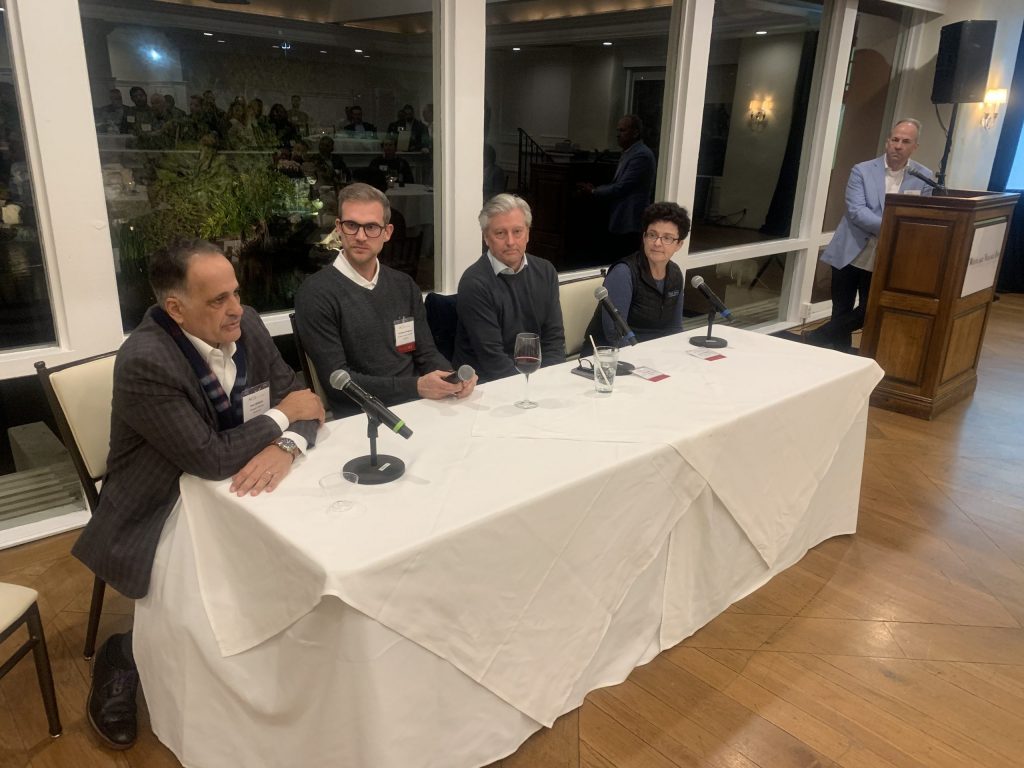Link to original article: Venture capital spending to keep cooling in ’23 amid economic concerns

By Mike Harris, Special to the Business Times
This year will be a cautious one for venture capital investors, panelists at a round table discussion in Westlake Village said on Jan. 18.
“I think it will be slow and cautious,” said moderator Scott Alderton, managing partner of Los Angeles-based law firm Stubbs, Alderton and Markiles, where he is a venture capital specialist. “Not frothy.”
Entitled “Exploring the State of Venture Capital in 2023 and beyond,” the event at the Westlake Village Inn was sponsored by the 101 Corridor chapter of the Association for Corporate Growth.
Alderton said the more prudent approach to venture capital investment will be due to the slow-down in the economy.
“I think investors are very concerned that consumers need to be there to drive growth in companies,” Alderton said.
Investors, he said, “are just going to make sure that there is really, really good product fit plus a higher scrutiny” of the companies seeking funding.
He did, however, add that “there’s still plenty of money, so good deals will get done.”
Panelist Ivan Nikkhoo, managing partner of Navigate Ventures, a venture fund focused on early/mid growth stage capital for emerging B2B enterprise and tech-focused companies, agreed that investing will be “more conservative than last year.”
“There will be a regression to norm from a valuation standpoint,” he said. “And a departure of tourist investors.”
The panel discussion covered a wide range of venture capital investing topics geared toward the new year.
Rick Smith, co-founder and managing director of Crosscut, a Los Angeles seed-stage venture capital firm, said he sees both good and bad things happening in his field in 2023.
“I think on the seed stage, you’re going to see a lot of funds go out of business,” he said. “And no one thinks it’s them, but it will happen.”
On the positive side, Smith said, “the drumbeat of entrepreneurs wanting to change the world in some way does not stop.
“It doesn’t move up or down with the Dow,” he said. “Most of them do not have money in the market, so when we come in crying about the Dow being down 10%, they’re like ‘who cares? I’m just trying to create the next satellite in space.’”
He added that his line of work is a pleasure given that “we’re still around those entrepreneurs that have that optimism.”
Noting declining investing across all industry sectors, Alderton asked panelist Matthew Nordgren what he is seeing in the emerging alternative wellness industry, which his firm, Arcadian Capital, specializes in funding.
“We can’t invest in a cannabis business,” Nordgren, founder and managing partner of the firm, replied. “But we do a lot of things that surround it.
“I think what you find in emerging industries is that a lot of people have a lot of motivation,” he said. “But they’re kind of blind to whatever else is happening.”
For instance, he said, he was talking to a company earlier Wednesday “that just did a round of $5 million valuation and they’re pitching ‘we’ll convert to a $150 million valuation.’”
Nordgren said he told them that “$5 million to $150 million is a thing of the past. You have to have revenue tied to valuation.”
“Those days are over,” he said. “I don’t know if we will ever be there again. And should we?”
Wrapping up the discussion, Alderton asked the panelists for their thoughts on funding female-owned companies.
“We evaluate all our companies equally,” said Martha Notaras, a general partner of Brewer Lane Ventures. “But that said, we will look harder at companies that have founders in categories that we want to add to our portfolio.
“And we do look to make sure that we can have a more diversified portfolio,” she said, noting that “there is a common wisdom in the market that females tend to be very capital-efficient.”
Capital invested in businesses nationwide with at least one female founder hit its highest annual level in 2021, said Suzie Doran, a partner with accounting and consulting firm Singer Lewak.
There were 4,642 such businesses, she said.
The second-highest annual level was in 2022, with 3,822 such businesses, she said.
